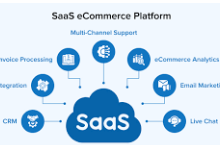Running an e-commerce business today means competing in a fast-paced digital marketplace where efficiency, scalability, and customer experience are everything. That’s where Software as a Service (SaaS) comes in. Instead of relying on expensive custom-built systems, online businesses now turn to SaaS products for everything from inventory management to customer engagement.
But with so many options available, how do you choose the right tools for your store? In this guide, we’ll highlight the best SaaS products for e-commerce that can help streamline workflows, optimize conversions, and scale your business effectively.
Why SaaS is Essential for E-Commerce
SaaS platforms are cloud-based tools accessible from anywhere, making them perfect for online businesses that require flexibility and scalability. Key benefits include:
- Lower upfront costs – No need for expensive software installations.
- Automatic updates – Stay current with the latest features and security patches.
- Scalability – Easily adjust your plan as your e-commerce business grows.
- Integration capabilities – Connect seamlessly with other apps and tools.
By leveraging SaaS solutions, e-commerce businesses can stay lean, agile, and competitive.
Best SaaS Products for E-Commerce
1. Shopify – Best for All-in-One Store Management
Shopify is one of the most popular SaaS platforms for building and managing online stores. From customizable storefronts to integrated payment gateways, it provides everything you need to launch and scale an e-commerce business.
Key Features:
- Easy drag-and-drop store builder
- Integrated payment processing
- 6,000+ apps for customization
- Multichannel selling (Amazon, Facebook, Instagram)
Why It’s Great:
Shopify is ideal for both beginners and established sellers who want a reliable, all-in-one solution.
👉 Learn more in our guide on how to implement cloud solutions.
2. BigCommerce – Best for Growing Enterprises
BigCommerce is another leading SaaS platform designed for mid-to-large e-commerce companies. It’s known for its robust features and scalability.
Key Features:
- Built-in SEO and marketing tools
- Flexible APIs for custom integrations
- Supports B2B and wholesale features
- Advanced analytics and reporting
Why It’s Great:
If your store is expanding rapidly and needs enterprise-level solutions without complex coding, BigCommerce is a top choice.
3. Klaviyo – Best for Email & SMS Marketing
Customer engagement is the backbone of e-commerce, and Klaviyo is a SaaS platform built specifically for personalized marketing.
Key Features:
- Advanced segmentation for targeted campaigns
- Pre-built automation flows (cart abandonment, post-purchase, re-engagement)
- SMS and email marketing combined in one platform
- Real-time analytics for campaign optimization
Why It’s Great:
Klaviyo helps increase repeat purchases and customer loyalty through data-driven personalization.
👉 Related read: best collaboration tools for remote teams.
4. Gorgias – Best for Customer Support
In the competitive e-commerce space, customer support can make or break your brand. Gorgias is a SaaS helpdesk tailored for online stores.
Key Features:
- Centralized support (email, live chat, social media, SMS)
- Automated responses to FAQs
- Integration with Shopify, BigCommerce, and Magento
- Data insights into customer interactions
Why It’s Great:
Gorgias empowers small support teams to deliver enterprise-level service, saving time while improving customer satisfaction.
5. ShipBob – Best for Fulfillment & Logistics
For many e-commerce businesses, logistics is a major pain point. ShipBob simplifies fulfillment by providing an end-to-end solution.
Key Features:
- Distributed warehouses for faster shipping
- Real-time inventory tracking
- Transparent pricing with no hidden fees
- Integration with major e-commerce platforms
Why It’s Great:
ShipBob helps reduce shipping times and costs, ensuring a better customer experience and repeat business.
6. SEMrush – Best for SEO & Competitor Analysis
Without traffic, even the best e-commerce store won’t succeed. SEMrush is a SaaS marketing tool designed to boost visibility and traffic.
Key Features:
- Keyword research and tracking
- Site audit to fix technical SEO issues
- Competitor analysis tools
- Backlink monitoring
Why It’s Great:
SEMrush gives you a complete picture of your online visibility, helping you outrank competitors and attract high-quality traffic.
👉 You may also like: how to optimize cloud costs.
7. Yotpo – Best for Reviews & UGC
Customer trust is everything in e-commerce. Yotpo helps businesses generate and showcase authentic customer reviews.
Key Features:
- Automated review requests
- Integration with loyalty programs
- Visual UGC (user-generated content) display
- Analytics on customer feedback
Why It’s Great:
Yotpo builds credibility and encourages conversions by showing real customer experiences.
8. Zendesk – Best for Scalable Customer Experience
For large e-commerce brands handling massive customer interactions, Zendesk offers a full suite of customer service solutions.
Key Features:
- Omnichannel support (chat, email, voice, social)
- AI-powered bots for automation
- Knowledge base and self-service portal
- Custom dashboards and reporting
Why It’s Great:
Zendesk is built for scale, making it a strong choice for e-commerce companies with high support demands.
How to Choose the Right SaaS Products for Your E-Commerce Business
With so many options available, it’s crucial to evaluate SaaS tools based on your business needs. Here are some factors to consider:
- Budget & Pricing Model – Ensure the SaaS tool fits within your monthly budget.
- Scalability – Choose tools that can grow with your business.
- Integration Capabilities – Check if it integrates with your current tech stack.
- Ease of Use – Opt for tools that your team can quickly adopt.
- Customer Support – Look for SaaS providers with reliable support channels.

Conclusion
The best SaaS products for e-commerce are the ones that align with your unique business goals—whether it’s building an online store, optimizing marketing, managing customer service, or handling logistics. Tools like Shopify, Klaviyo, ShipBob, and SEMrush are among the most trusted names in the industry, but the ultimate choice depends on your budget and growth strategy.
By integrating the right SaaS solutions, you can streamline operations, improve customer experience, and scale your e-commerce business faster.